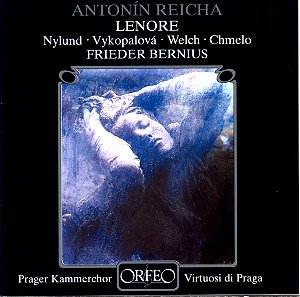Comparison Version: Mátl/Supraphon/1986
Antonín Reicha is one of what seems like
an endless number of composers who bridged the gap between the
Classical and Romantic periods. The appeal of these composers’
music is mainly the mix of the traditional classical style and
the emerging romantic approach. In effect, exacting form and elegance
meet flexibility and angst.
Reicha was one of the most gifted composers of
the early-romantic period. His technical expertise in musical
architecture was superb, his works displayed a keen ability to
offer logic and sweep, and he was adept at all musical forms.
I tend to place Reicha with Louis Spohr and Johann Nepomuk Hummel
as the best composers of the early-romantic era. The music of
each is very enjoyable and often outstanding.
Reicha is likely best known for his many wind
quintets that have been recorded complete on the CPO label. Also
highly rewarding are his other chamber works, a small number of
symphonies, a few sacred choral works, and his thirty-six Fugues
for Piano.
The disc at hand is a dramatic cantata on the
fantasy text of a ballad written by Gottfried August Bürger
in 1773. The poem is a story of love, despair, and the seemingly
endless road to death. Wilhelm has gone off to war as his beloved
Lenore waits for his return. The Army’s troops do return, but
Wilhelm is not among them. Seven long years pass, and Lenore still
waits in a state of anguish that she expresses quite vehemently
to her mother. Finally, an other-worldly Wilhelm appears on his
horse and beckons Lenore to hop aboard as they gallop to their
nuptial bed; the crafty Wilhelm leaves out the fact that they
are destined for their graves. After a long journey, they reach
their destination, and Wilhelm becomes a skeleton and Lenore dies.
Bürger was not a highly regarded writer.
In fact, he was ridiculed on a frequent basis. Judging from "Lenore",
the ridicule might have been warranted. The plot is very thin,
and character development non-existent. Wilhelm is only a wooden
figure with just one thought on his mind, to take Lenore to her
death. Lenore is also one-dimensional and ridiculously gullible
as to Wilhelm’s intentions. Bürger simply does not inject
any meaningful human qualities into his figures.
Fortunately, Reicha’s music to the inadequate
story telling saves the day. He invests his composition with ample
variety of instrumentation, vocal contribution, musical form,
and breadth of emotion. Essentially, Reicha gives life to the
wooden text, and I commend him for the accomplishment. While his
"Lenore" is not a masterpiece by any means, it is consistently
enjoyable and holds one’s attention throughout.
Frieder Bernius excellently leads the new Orfeo
performance with compelling contributions by the chorus. Each
of the vocal soloists is appropriately expressive and of attractive
tone. Sound quality is superb, allowing all of Reicha’s musical
detail and counterpoint to shine through.
Although Reicha’s "Lenore" is quite
obscure, there is another recording of it on Supraphon that is
also rewarding. However, the age of the performance does show,
and Mátl doesn’t deliver as vibrant or strongly punctuated
a performance as Bernius.
There is one feature advantageous to the Supraphon
release. It offers the text in four languages including English;
Orfeo only gives us the German text. That could be quite damaging
to an understanding of the plot and human emotions, but the music
is much more expressive than the text and Orfeo does provide a
fine synopsis of the plot.
For readers enamored of the musical bridge connecting
the Classical and Romantic eras, this new Orfeo recording of Reicha’s
"Lenore" is self-recommending. If the absence of the
text in English is significant, I can confidently suggest the
Supraphon release as a valid alternative. Whichever you choose,
Reicha’s music is very alluring and worth your investigation.
Don Satz
